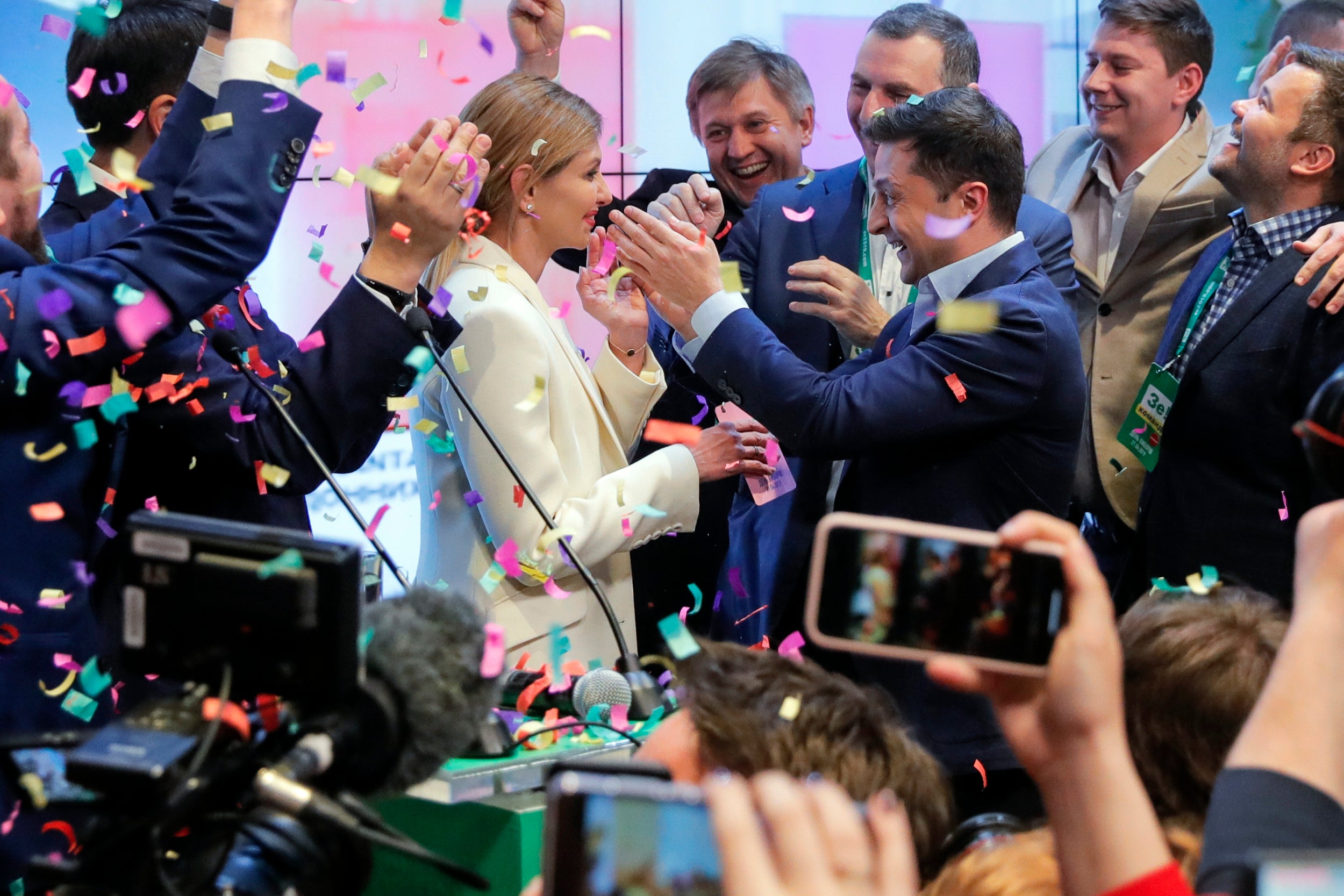Zelensky will struggle to find the funny in Ukraine’s geographical and political realities
The president-elect is confronted with the same geopolitical imperatives as his immediate predecessors – the choice between Russia and the EU, or a possibly more neutral future

No joke, then. No policies either. The remarkable victory of a comedian in the Ukrainian presidential election was certainly historic, though his campaign offered few clues as to what kind of a leader he will turn out to be. His slogan, after all, was “No promises. No apologies”. It worked.
Volodymyr Zelensky, a comic actor who might be roughly equated to Steve Coogan or Ricky Gervais, thrashed the incumbent Petro Poroshenko by 75 per cent of the popular vote to 25 per cent. President Poroshenko, a diabetic who made his millions from confectionery, has made little progress in solving Ukraine’s fundamental problems during his five years in power.
Endemic corruption remains a way of life, sapping the confidence of citizens and potential onward investors. The war with Russian-backed separatists in the east of the country drags on. Crimea remains under illegal Russian occupation. Living standards are sliding. Mr Poroshenko, though pro-EU and an enemy of the Kremlin, was always going to have a difficult struggle to win this contest in such conditions, even against another conventional politician. Mr Zelensky’s unusual satire-fuelled insurgency simply swept him away.
In that respect, Mr Zelensky resembles other populists leaders – though he lacks, for now, the nationalistic edge of, say Donald Trump or Beppe Grillo, the fellow comedian who led Italy’s Five Star movement. Mr Zelensky’s appeal most closely resembles that of Emmanuel Macron and his En Marche! vehicle. Like Mr Macron, Mr Zelensky seeks a doctor’s mandate, a more-or-less free hand to cure the nation’s ills.
Ukrainians, unsettled and demoralised, have placed their trust in him, hoping that the parodic title of Zelensky’s hit TV show, Servant of the People, will become an honourable slogan for him as he cleans up Ukraine’s gangsterish business and political culture – and tries to get the Russians off their backs.
For Ukraine has the huge misfortune to find itself straddling one of the world’s great fault lines. That is its defining fact. To its east and its north lie Russia and Belarus, a virtual Russian puppet ruled by Europe’s last true dictator. These are neighbours who belong to the network of Russian orthodox states – heirs to the USSR and the Czarsit empires of the past – and into which Ukraine was once firmly locked. The east of Ukraine feels closer to this Eurasian world than to Europe.
To the west and south is the European Union and the (relatively) democratic and prosperous Poland, Slovakia, Hungary and Romania. Ever since the collapse of the Soviet Union in 1991, independent Ukraine has tried, Janus-like, to please both sides.
By the time of the Euromaidan revolution in 2014 many Ukrainians, though not the then-government, were more prepared to embrace the EU, and wished to integrate with their Catholic neighbours to the west, moving towards association with the EU and even Nato membership. Russian alarm over this, and the increasingly aggressive foreign policy of Vladimir Putin, created the conditions for the present state of low-level hostilities between the two nations.
Insofar as Mr Zelensky has indicated any policy preferences, it is for Ukrainians to be granted referendums on EU and Nato membership, though only when these become realistic possibilities – never, if Moscow has anything to do with it. Mr Zelensky’s best option might be to transform his country from being a battleground between east and west into a strictly neutral buffer state, a little like Finland used to be.
That would be the next logical step on from the 2015 Minsk agreement, which arranged for a ceasefire and gradual de-escalation and disarmament in the east of Ukraine. However, that accord, brokered by France, Germany and Russia, has hardly ever stuck, and the trend has been towards a state of semi-permanent, small-scale military activity.
The regional balance of power is not symmetrical, unfortunately for Ukraine. Russia regards its neighbour as part of its sphere of influence, and has a proprietorial attitude towards it. The EU is less committed to absorbing Ukraine (with its low standard of living, controlled markets and corruption) fully into its economic and financial structures. Few in Brussels yearn for Russia as an immediate neighbour. Put bluntly, Russia will fight for its interests in Ukraine: the EU and US will not.

Mr Zelensky, then, is confronted with the same geopolitical realities as his immediate predecessors – the choice between Russia and the EU, or a possibly more neutral future. The present situation is inherently unstable, and leaves open the possibility of an even more aggressive Russian incursion into sovereign Ukrainian territory. Mr Zelensky should expect some early provocations from the Kremlin to test his resolve.
A clever man, a qualified lawyer as well as gifted actor and wit, Volodymyr Zelensky will need all of his native cunning to deal with President Putin, a clever and ruthless man not fabled for his ready sense of humour. For now, at least, Mr Zelensky has his country behind him.
Join our commenting forum
Join thought-provoking conversations, follow other Independent readers and see their replies
Comments
Bookmark popover
Removed from bookmarks